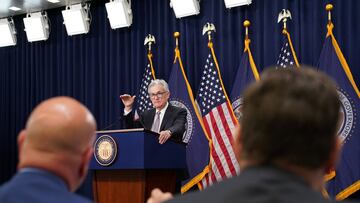Was the 0.25% interest rate hike in May the last increase for 2023?
The Federal Reserve voted unanimously to raise interest rates for a tenth time. Chairman Jerome Powell said policymakers haven’t decided yet to pause hikes.

The Federal Open Market Committee (FOMC) wrapped up its May meeting on Wednesday with a unanimous decision to raise interest rates by another 25 basis points. That’s the tenth hike since March 2022 pushing interest rates above the 5 percent mark for the first time in over a decade. Policymakers have ratcheted up borrowing costs at the fastest pace since the 1980s to tame inflation not seen in four decades.
Chairman Jerome Powell, speaking at a press conference after the meeting, signaled that the US central bank may pause further rate hikes pointing to a change in language from the Fed. In the FOMC’s statement, “some additional policy firming may be appropriate,” as policymakers assess the effect of their rate increases, was replaced with the FOMC saying it will now determine, based on a range of factors, “the extent to which additional policy firming may be appropriate.”
Was the 0.25% interest rate hike in May the last increase for 2023?
Interest rates have gone from 0.25 percent to 5.25 percent, an over twenty fold increase, since March 2022. This has driven up the cost of borrowing, more than doubling mortgage rates. Through the monetary tightening the US central bank is trying to bring inflation back to its two percent target by throttling spending and loosening the labor market.
While Powell signaled that policymakers may pause rate hikes to step back and assess their impact, he indicated that the FMOC would make that decision on a meeting-by-meeting basis. He wouldn’t say what it would take for the Fed to hike rates again merely telling reporters: “I just think we’ve moved a long way fairly quickly and I think we can afford to look at the data and make a careful assessment.”
Fed Chair Powell's interest rate hikes risk pushing our economy into a recession and causing pain for millions of Americans who could lose their jobs — hardworking people who have grocery, rent or mortgage payments. The Fed needs to end these hikes. pic.twitter.com/eMLnLBA17y
— Elizabeth Warren (@SenWarren) May 3, 2023
Banking turmoil may help stop rate hikes
Some of their work could be done by banks tightening their lending after three collapsed within six weeks of each other. The most recent was First Republic which was purchased by JP Morgan in an orderly resolution at the end of April. Both Signature Bank and Silicon Valley Bank were put into FDIC receivership in mid-March kicking off turmoil in the banking industry prompting emergency measures to be taken.
Related stories
The next Federal Open Market Committee meeting is in six weeks on 13 and 14 June. That will come after the US has passed the date for when the US could default on its financial obligations if Congress doesn’t pass an increase for the debt ceiling. Treasury Secretary Janet Yellen has said the “X Date” could come as soon as 1 June. Even waiting until the last minute to act to avoid extreme harm to the US, and in turn global, economy could still cause problems.
“No one should assume that the Fed can protect the economy from the potential short and long-term effects of a failure to pay our bills on time,” Powell told reporters. “It’s just as important that we never get to a place where we’re actually talking about or even having a situation where the US government’s not paying its bills.”


